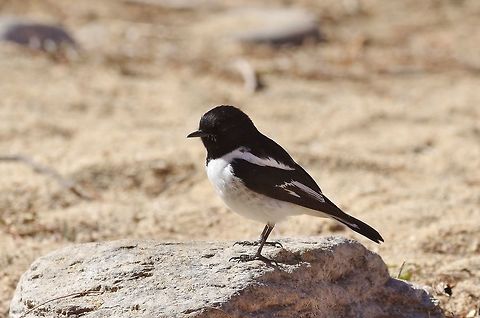
Appearance
The hooded robin is around 16 cm in length. The male has a distinctive pied coloration; with a black head and neck , white chest and underparts and black wings with white wing-bars. The eyes, bill and feet are also black. The female is an undistinguished grey-brown above with a pale grey throat and paler underneath with dark brown wings and white wing bars. Juveniles are similar to females.Distribution
It is found across the Australian continent, though not in Cape York nor Tasmania; its natural habitat is Mediterranean-type shrubby vegetation.Status
Hooded robins are not listed as threatened on the Australian Environment Protection and Biodiversity Conservation Act 1999. However, their conservation status varies from state to state within Australia. For example:⤷ The hooded robin is listed as threatened on the Victorian Flora and Fauna Guarantee Act . Under this Act, an ''Action Statement'' for the recovery and future management of this species has not yet been prepared.
⤷ On the 2007 advisory list of threatened vertebrate fauna in Victoria, the hooded robin is listed as near threatened.
Reproduction
Breeding season is July to November with one or two broods raised. The nest is a neat cup made of soft dry grass and bark. Spider webs, feathers and fur are used for binding/filling, generally in a tree crevice, hollow or fork. The clutch generally consists of two pale olive- or bluish-green eggs with darker spots and blotches measuring 21mm x 16 mm.References:
Some text fragments are auto parsed from Wikipedia.